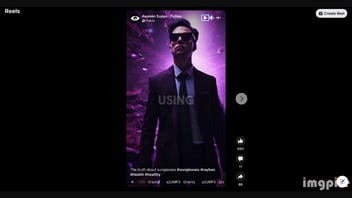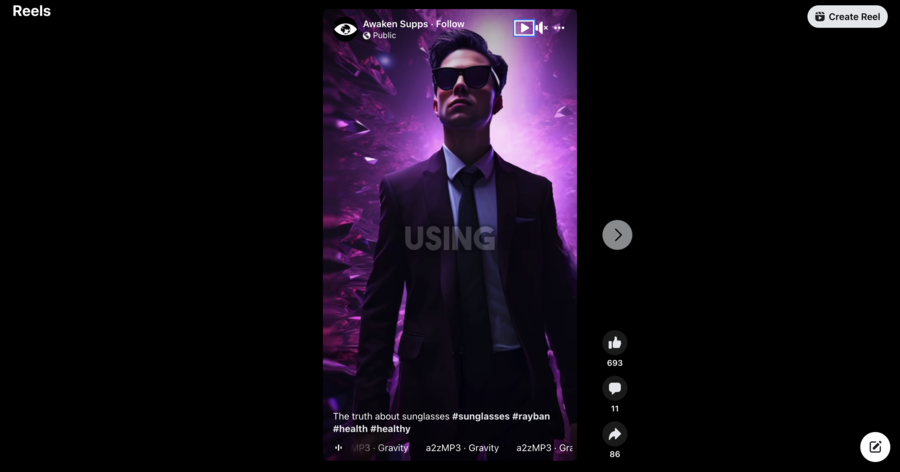
Are sunglasses "bad for your eyes" because they trick the brain into believing the sun isn't that hot, thus leading to more severe sunburn? No, that's not true: There is no evidence to substantiate this claim. Lead Stories spoke to the American Academy of Ophthalmology and two board-certified dermatologists who all told us this claim was false and that individuals should continue wearing sunglasses and sunscreen to protect themselves from the sun's ultraviolet (UV) rays.
The claim appeared on Facebook (archived here) on August 6, 2023. It opened with a narrator saying:
Stop using sunglasses. They are bad for your eyes. I know what you're thinking, so let me explain.
This is what the post looked like on Facebook at the time of writing:
(Source: Facebook screenshot taken on Mon Aug 7 19:30:27 2023 UTC)
The narrator states that on a sunny day the strength of sun is being monitored by the eyes. The message the eyes receive from the sun is sent to the brain and the brain decides how the skin should react to the intensity of the sun. If it's a hot and sunny day, the brain tells the skin to close its "little receptor sites" so the skin doesn't burn so easily. But if you go outside with sunglasses, the eyes tell the brain the sun isn't as intense as it actually is because the sunglasses are shielding your eyes from the full strength of the sun.
The video does not give any scientific evidence to back up the claim.
Vered Hazanchuk, public relations manager at the American Academy of Ophthalmology (AAO), wrote to Lead Stories about the claim in an August 8, 2023, email:
That's false, wearing sunglasses is an essential step for UV protection..more here.
The link Hazanchuk included was a page on the AAO website titled, "The Sun, UV Light and Your Eyes." The page tells readers that sunglasses are needed for protection against the UV rays the sun emits. Constant exposure to UV light can also lead to "potentially blinding eye diseases and tumors." The site recommends wearing a hat along with sunglasses that provide UV400 protection. UV400 blocks both UV-A and UV-B rays. More information on UV-A and UV-B radiation can be found here. The page does not say that all sun exposure is negative. Exposure to a little natural light can help a person sleep better, and spending time outdoors can prevent nearsightedness in children.
Dr. Joshua Zeichner, a board-certified dermatologist and a director of cosmetic and clinical research in dermatology at Mount Sinai Hospital in New York City, also told Lead Stories that the post's claim is false. In a August 8, 2023, email he wrote:
This claim is not true. The skin is just as likely to get a sunburn if you are wearing sunglasses as it is if you weren't wearing them. The only issue would if sunglasses change your perception of how sunny it actually is, keeping you outdoors longer than you would be otherwise. Especially if you are not wearing sunscreen, longer exposure to UV light increases the likelihood of a sunburn.
Dr. Lisa Chipps, a board-certified dermatologist and dermatologic surgeon based in California, also told Lead Stories that this claim is incorrect and that there were no "little receptors in the skin" that protect against sunburn. In an August 8, 2023, email Chipps wrote:
No, this is not true. There are no 'little receptors in the skin' that protect against sunburn. As a dermatologist, I recommend UV protection for the skin in the form of protective clothing, sunscreens, and shade. Because UV exposure can damage the delicate tissues of the eyes, it is a good idea to wear UV-blocking sunglasses to protect the eyelids and corneas against skin cancers and cataracts.
The Ohio State University Wexler Medical Center has a page on the five ways to avoid getting sunburned as well. The tips are as follows: Put on sunscreen, avoid being in the sun from 10 a.m. to 4 p.m., cover up, wear a big hat and sunglasses, and remember that the sun's UV rays can pierce through clouds. There is no mention of sunglasses leading to more severe sunburns.
Other Lead Stories articles on claims concerning sun exposure can be found here.














